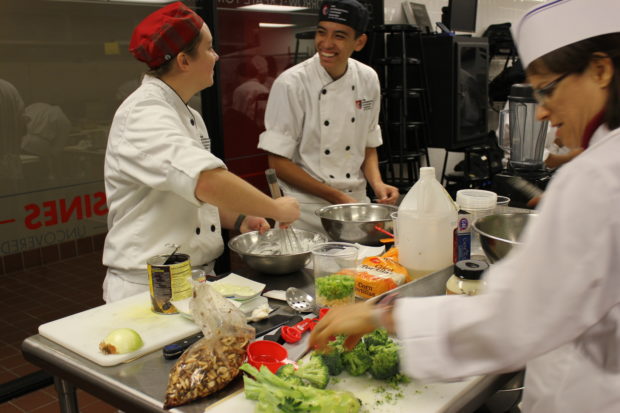
Thanks to our training program for food service professionals, more than 350 K-12 schools, universities, hospitals and even military bases have launched plant-forward menus. Photo by Kristie Middleton/The HSUS
There have been plenty of headlines about the United States pulling away from the Paris agreement on climate change. But even among individuals, institutions, and nations deeply committed to the cause of minimizing the human impact on climate, there is still too little attention to the role of agriculture. Despite being one of the biggest contributors to greenhouse gas emissions, agriculture is essentially unregulated. If we care about saving animals and people from the ravages of climate change, we have to change the way we produce and consume food, reduce our personal carbon footprint, and minimize food waste.
One program we are really proud of, and that continues to grow, is a training program for food service professionals that has so far trained more than 3,000 chefs and culinary professionals in increasing the proportion of plant-based foods they prepare and serve. Thanks to these trainings, more than 350 K-12 schools, universities, hospitals, and even military bases have launched plant-forward menus. A single institution’s policy to reduce meat purchases can make a dramatic difference for farm animals. For example, Los Angeles Unified School District, which serves 700,000 meals a day, will alone will spare 4.6 million animals annually from factory farms. Instead of the standard fare of chicken nuggets and pepperoni pizza found on so many school menus, schools that have been through our training are serving Baja Bean Tacos, Amazing Lo Mein, and Protein Packed Two Bean Chili.
The program launched two years ago, after we piloted a program to train Harvard University’s culinary team on how to create delicious, hearty, and sustainable fare that happens to be plant-based. We did this after hearing that they were doing a “Less-Meat Monday,” and were seeking some creative culinary tools and ideas for their chefs. We brought in Wanda White, a classically trained pastry chef, to create a two-day, hands-on culinary training program that trains culinary professionals in how to make breakfast, lunch, dinner, and dessert – all plant-based.
With the help of dietitian Karla Dumas we developed a similar program for K-12 food service professionals to show them how to create plant-based foods that meet National School Lunch Program guidelines, are delicious, and nutritious. These trainings not only give the professionals the tools to put this more humane fare on their menus, but educate them on the reasons for doing so, while providing a team-building opportunity.
The program has been so successful, we’re now taking it around the world. Last week we held our first culinary training in Canada with Humane Society International, co-hosted with Vancouver Humane Society and the University of British Columbia. The feedback has been uniformly positive. Wolfgang Sterr, executive chef for Whistler Black Comb, the number one rated ski resort in North America, attended the training in Vancouver. He said of the training that it had been one of the most inspiring days he’d had in years. His words are similar to the feedback we’ve received from other food industry professionals.
We’ve now hosted plant-based culinary programs in countries as diverse as South Africa, Bangladesh, Vietnam, Mexico, the United Kingdom, and Brazil, answering the signal call to help not only make the case for a more plant-centric diet, but to help show the culinary world that plant-based foods are good for animals, good for the planet, good for guests, good for the bottom line, and good to prepare and eat.
On top of this work, we continue to collaborate with family farmers everywhere to support them and their approach to treating animals well, and giving Americans a choice to support more humane animal husbandry as part of a broader solution to the threat of factory farming worldwide. While instilling an ethic of appreciation for animals and farmers, we are providing an argument against food waste. Amazingly, Americans throw away 22 percent of all animal products – a staggering loss of life and an immense contributor to greenhouse gas emissions. We are working on ways to eliminate this kind of reckless food waste.
Consumers have more power than they realize to mitigate the human impact on the planet by eating in a more humane and sensible way. It’s not just the cars we drive and the light bulbs we install. It’s about the menu options we select and the food on our plates. By making better choices in all aspects of our lives, we can do so much to turn around an atmospheric crisis of our own design and help animals, farmers, and rural communities.
The post Combating climate change by thinking about diet appeared first on A Humane Nation.
Enviroshop is maintained by dedicated NetSys Interactive Inc. owners & employees who generously contribute their time to maintenance & editing, web design, custom programming, & website hosting for Enviroshop.
